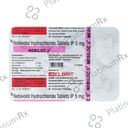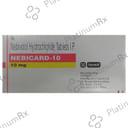Nebivolol
Uses
Nebivolol is used in the treatment of hypertension (high blood pressure), heart attack, stroke, and migraine.
How it Works
How Nebivolol works Nebivolol is a beta blocker that specifically targets the heart. It functions by slowing down the heart rate and enhancing the heart's efficiency in pumping blood throughout the body.
Side Effects
Common side effects of Nebivolol include headache, fatigue, diarrhea, and dizziness.
Expert Advice
- Nebivolol lowers blood pressure and facilitates the heart's ability to pump blood throughout the body.
- Lowering high blood pressure helps prevent stroke and heart attack.
- It may cause dizziness; if this occurs, rise slowly from a sitting or lying position.
- Nebivolol can mask symptoms of low blood sugar in diabetic patients; therefore, monitor blood sugar levels regularly.
- Do not discontinue Nebivolol suddenly, as this may lead to a rapid increase in blood pressure, thereby elevating the risk of heart attack and stroke.
Related Medications
Nebivolol 5mg

₹53.3
₹67.4
MRP ₹168.5
Nebivolol 5mg

₹84.5
₹67.4
MRP ₹168.5
Nebivolol 5mg

₹63.8
₹67.4
MRP ₹168.5
Nebivolol 5mg

₹109
₹67.4
MRP ₹168.5
Nebivolol 5mg

₹79
₹67.4
MRP ₹168.5
Nebivolol 5mg

₹117.2
₹67.4
MRP ₹168.5
Nebivolol 5mg

₹95
₹67.4
MRP ₹168.5
Nebivolol 5mg

₹83
₹67.4
MRP ₹168.5
Nebivolol 5mg

₹173.4
₹67.4
MRP ₹168.5
Nebivolol 5mg

₹56.3
₹67.4
MRP ₹168.5
Nebivolol 2.5mg

₹104.1
₹35.5
MRP ₹71
Nebivolol 2.5mg

₹51
₹35.5
MRP ₹71
Nebivolol 2.5mg

₹48
₹35.5
MRP ₹71
Nebivolol 2.5mg

₹64
₹35.5
MRP ₹71
Nebivolol 2.5mg

₹74.8
₹35.5
MRP ₹71
Nebivolol 2.5mg

₹30
₹35.5
MRP ₹71
Nebivolol 2.5mg

₹37
₹35.5
MRP ₹71
Nebivolol 2.5mg

₹45
₹35.5
MRP ₹71
Nebivolol 2.5mg

₹65
₹35.5
MRP ₹71
Nebivolol 10mg

₹120
MRP ₹240
Nebivolol 5mg

₹51.4
₹67.4
MRP ₹168.5
Nebivolol 5mg

₹141
₹67.4
MRP ₹168.5
Nebivolol 5mg

₹75
₹67.4
MRP ₹168.5
Nebivolol 10mg

₹168

₹120
MRP ₹240
Nebivolol 10mg

₹289.9

₹120
MRP ₹240
Flat ₹100 off on first app order | Use Code: APP100 |
Flat ₹100 off on first app order
USE CODE: APP100

Download Now